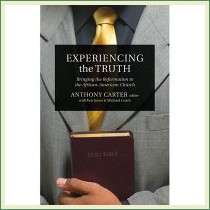I received several email responses to last week's post, but I wanted to respond to two of them because I believe they summarize the heart of the evangelical instinct, and provides the impetus for a where a more Reformed hermeneutic would help the church provide a cogent and consistent message about the necessity of faith in Christ for personal redemption. These comments were made by my good friends Mark and Barry, shown as responses to the previous post, and each are faithful to a good reading of scripture...though I humbly believe they've fallen a bit short.
Mark: General Revelation & Spiritual AccountabilityTwo very provocative points were made in Mark's response, specifically concerning the sufficiency of general revelation and what some call "concurrent dispensations", i.e. that the Lord deals with those who have been exposed to the gospel based on their acceptance or denial of it, and for those who are ignorant of it, based on their moral conformity to the law and the judgment of their conscience. Let's first deal with the sufficiency of general revelation.
We should be clear that NO revelation, general or special, is sufficient to save without the regenerative work of the Holy Spirit. Lionel has begun an interesting discussion on a related thought in his
blog, but it is important to underscore that even when God's requirements are clearly enumerated in the law beyond general revelation, our hearts are
incapable of responding in an obedient and righteous way: Romans 3:20, 8:3-4; Ephesians 2:1-3.
Further, Paul states rather clearly that gentiles outside the gospel message "have no hope" (Ephesians 2:12 & 1 Thess 4:13), and it is fairly clear from the biblical witness that the natural religious impulses of the pagan heart and mind are toward idolatry and the exaltation of lusts. This is a byproduct of a sinful heart and occurs 100% of the time. I think the challenge for those who seek to make ignorance a defense against accountability is to deal with the sin problem of those who have not heard of Christ: are their sins forgiven apart from direct faith in Christ? The real question is, however: is there a regenerative work of the Holy Spirit apart from the message of the Lordship and work of Christ?
Biblically, I believe there is not. But, I am not ashamed to confess a fear of God in this and yet I know He knows my motive is only for integrity to His word as revealed. Our God is a consuming fire and the eternal destiny of souls is among the gravest concerns in all the universe, and only He has the authority to make these pronouncements...and I believe He has spoken accordingly in his revealed word. This is also why I believe the missological and evangelistic mandate is of great importance...Lord, please forgive my not making it the highest priority of each day!
On to Mark's second point...
Concurrent dispensation: The Lord judges those who know the truth by that standard, and those who don't know the truth are judged by their conscience. Probably the most commonly cited passage that supports Mark's point is Romans 2:12-16. Many, I believe, are misled in this text because they connect Paul's parenthetical statement in verses 14 & 15 to the last sentence in this paragraph in verse 16. But it is really verses 12 & 13 that are connected to 16 which really establishes that accountability DOES exist outside the revelation of law (
all who sin apart from the law will also perish apart from the law). Verses 14 & 15 in this passage do not mean that the conscience of those who don't have the law is capable of leading them to righteousness, but that the conscience serves the function the law does for those who have received it, namely the highlighting of sin. Neither law nor conscience has the
power to overcome sin's effect on the human heart...nor the human condition!
Paul makes an interesting point to the people of Athens in Acts 17:30 -
In the past God overlooked...ignorance, but now he commands all people everywhere to repent. Is this repentance possible without the preaching of the word of Christ? Some might suggest that God worked in this vein in OT times before the incarnation, i.e. that he worked among non-Jewish gentiles outside the old covenant and direct influence of the law, e.g. Nebuchednezzar (Daniel 4:37) and Neco of Egypt (2 Chr 35:21), and that he can do the same thing among those who have not heard of Christ.
Touche; God can do and does what he wants...who can stay his hand? (But no one would suggest that God is random or capricious!) However, should the fact that Enoch walked with God, never tasting death, or that Elijah was carried away in a chariot fire give us reason to suggest that death is likely to miss some today? Should the fact that there will be one generation that will be alive when Christ returns and accordingly not experience death, nullify the truth of the biblical statement:
man is destined to die once, and after that to face judgment(NIV)?
Biblically at least, it is clear that humanity has inherited condemnation from Adam, Romans 5:12-21. Another good friend has suggested that a God of perfect love would not condemn humanity for the actions of an elder brother. But, we all die because of the actions of that elder brother...moreover, we should not forget that we are made righteous, not by our own actions, but by the righteousness of a different elder brother, namely Jesus Christ.
Barry: The Soul Who Sins Shall DieThis statement from Ezekiel 18:20 reminds us that "generational sin" is not a curse as some suggest it is, a son will not be condemned for the sins of his father. I believe the core message here, this side of the fall, is that each of us are individually accountable before God. We are not in the same state that Adam was in, who was completely morally innocent before God. David said very clearly in Psalm 51:5 -
Surely I was sinful at birth, sinful from the time my mother conceived me...this tells us that our sin situation is pervasive and precedes any choice on our part. We are not sinners because of bad choices, but make bad choices because we are sinful...
Closing Thoughts...What strikes me about the responses to this question is the hearts and minds that produced these and others that I heard: all of them were from individuals who have hearts for God and love for the saints. None of them would argue against the core message of the gospel...intentionally. However, I believe that in many ways that the lessons of the European Reformation are being lost on the church today, namely that a reliance on convention and intuitive reason apart from the guiding light of scripture will lead the church into confessional compromise. The fact that most good Christians will allow that salvation is possible apart from faith in Christ, under any contemporary circumstance, suggests that much of what the bible teaches about the bad news portion of the gospel is lost on the church today.
It is no surprise that most public preaching and teaching centers on the practical urgencies of individual life circumstances...making the Lord sovereign over them (a good thing) instead of the larger soteriological imperative: imploring natural born sinners to embrace God's merciful act of love or remain the object of his judicious wrath. Here is an experiment to attempt today: read Jonathan Edwards'
Sinners in the Hands of Angry God to a congregation and judge the response...




